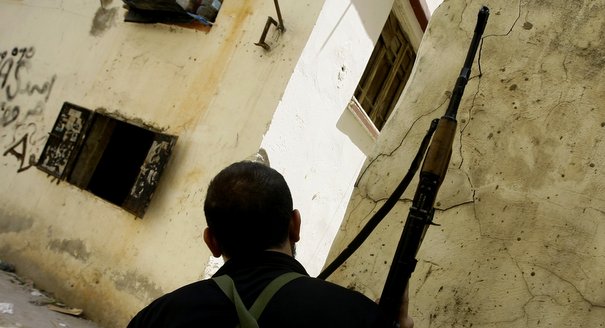The formation last March of a coalition government in Beirut between political forces that support Syrian President Bashar al-Assad and those that oppose him is transforming the security situation in Lebanon’s deeply divided northern port city of Tripoli. A bold new “security plan” enforced by the Lebanese Armed Forces has put an end to escalating sectarian violence between the city’s Sunni-dominated area, Bab al-Tabbaneh, and the Alawite stronghold of Jabal Mohsen.
The recent calm presents a historic opportunity for Lebanese Alawites to search for new leaders who embrace a more independent approach toward Damascus and a more conciliatory posture toward Tripoli’s Sunni majority. But this search will be a long and difficult one.
The Fall of a Syrian Proxy
Enmity between Jabal Mohsen and Bab al-Tabbaneh is long-standing. Fighting started when the Arab Democratic Party (ADP), an Alawite political party and militia active in Tripoli, supported Syria’s 1976 intervention in Lebanon and began acting as a local proxy for the Assad regime in Tripoli. At the time, Ali Eid, the ADP’s head, was particularly close to Rifaat al-Assad, the brother of the then Syrian president Hafez al-Assad. This friendship gave the ADP leader access to funds and weapons, thus enabling him to rule Jabal Mohsen and parts of Tripoli with an iron fist. But it also cost him dearly when Rifaat al-Assad’s failed coup against his brother in 1983 encouraged Hafez al-Assad to temporarily sideline Ali Eid.
It was only when Bashar al-Assad succeeded his father in 2000 and Ali Eid transferred power to his son Rifaat that the relationship between the ADP and Damascus started growing again. The 2005 Syrian withdrawal from Lebanon gave the Assad regime further impetus to prop up its proxies in Lebanon, including the ADP in Tripoli. Syria transferred significant amounts of money and weapons to Jabal Mohsen when sectarian fighting erupted in Lebanon in 2008 and again following the Syrian uprising in 2011.
In exchange for the Assad regime’s generous financial and military support to Rifaat Eid, the ADP had to show its unconditional loyalty to Damascus. “We support Bashar al-Assad in the framework of the Syria crisis because he stands up to Western aggression,” an aide close to Rifaat Eid told me a few weeks ago. But the ADP went one step further by directly implementing the Syrian regime’s agenda in Tripoli. High-ranking ADP officials were recently found guilty by the Lebanese judiciary of having cooperated with Syrian intelligence in the August 2013 bombing of two high-profile Sunni mosques in Tripoli that cost the lives of 47 worshippers and wounded hundreds.
The advent of the Lebanese coalition government fundamentally changed the ADP’s equation. The Lebanese Army’s security plan for Tripoli stopped the fighting between Bab al-Tabbaneh and Jabal Mohsen and led to the quick arrest of a number of Alawite militiamen loyal to the ADP. These developments were shortly followed by fresh charges from the Lebanese judiciary accusing Rifaat Eid himself of having “carried out terrorist acts in Tripoli”—a move that precipitated his exile and that of other high-ranking ADP officials to Damascus, where they now reside in a maximum-security compound.
The Search for an Alawite Alternative
So far, no one has dared to fill the void left by Rifaat Eid’s exile to Syria. The Eid family’s brutal, decades-long rule over Jabal Mohsen left a scar on the political subconscious of many Lebanese Alawite dissidents. Nevertheless, signs of change are emerging. Many Alawites were reassured by the security plan, which also involved a crackdown on Sunni militia leaders, and successful demilitarization measures have reduced the community’s reliance on weaponry long provided by the ADP and Damascus. Even the Alawite Grand Mufti Assad Assi, an ally of the Eid family who still lives in Jabal Mohsen, has recently mellowed his rhetoric and now calls for “reconciliation” between Tripoli’s Sunnis and Alawites.
But two challenges ensure that the search for an Alawite alternative to the ADP will be a long and difficult one. First, even though there is no shortage of political talent in Lebanon’s Alawite community, the country’s political system does not facilitate the emergence of these figures on the national stage. Lebanon has a confessional system whereby jobs and political positions are distributed according to religion, yet the voting process for parliamentary elections occurs on a geographical, rather than confessional, basis. Effectively, this means that the two members of parliament allocated to the Alawite community are elected primarily by Sunnis from Tripoli and the northern countryside of Akkar—a fact that raises doubts about the parliamentarians’ ability to represent Alawite interests and positions.
The second challenge will be for Lebanon’s Alawite minority to overcome its own internal divisions. The community is split between those who favor setting up a platform meant to defend the sect’s interests in Lebanon and those who claim the long-standing Alawite tradition of secularism and call on their co-religionists to invest in existing political parties that are not strictly Alawite. “I don’t want to witness the emergence of another Alawite party like the ADP,” argued a local civil society leader in Jabal Mohsen. “We can be more effective in battling sectarianism if we join other parties—just like we did in the 1950s and 1960s, when Alawites were prominent in the Iraqi Baath Party and in the Communist Party.”
Whatever choice they make, there is a growing sense among Lebanon’s Alawites that the ADP’s uncompromising alliance with the Syrian regime has hurt their security position and their standing domestically. “It’s time we realize that we are Lebanese living in Lebanon,” summed up a local leader in Jabal Mohsen. The question is how Damascus will respond to this emerging new reality.






